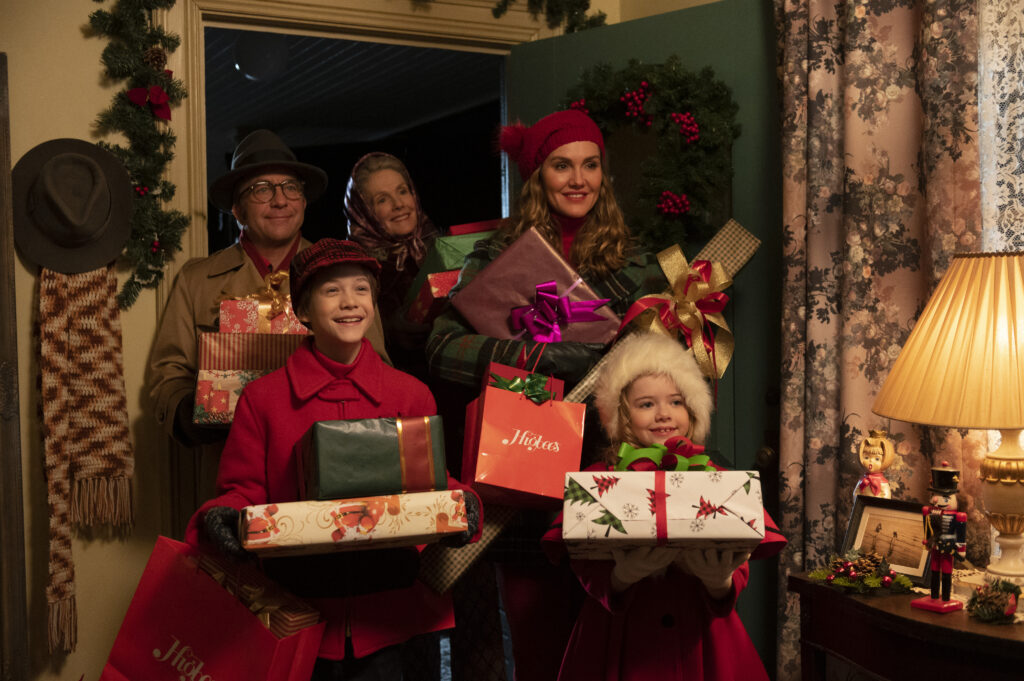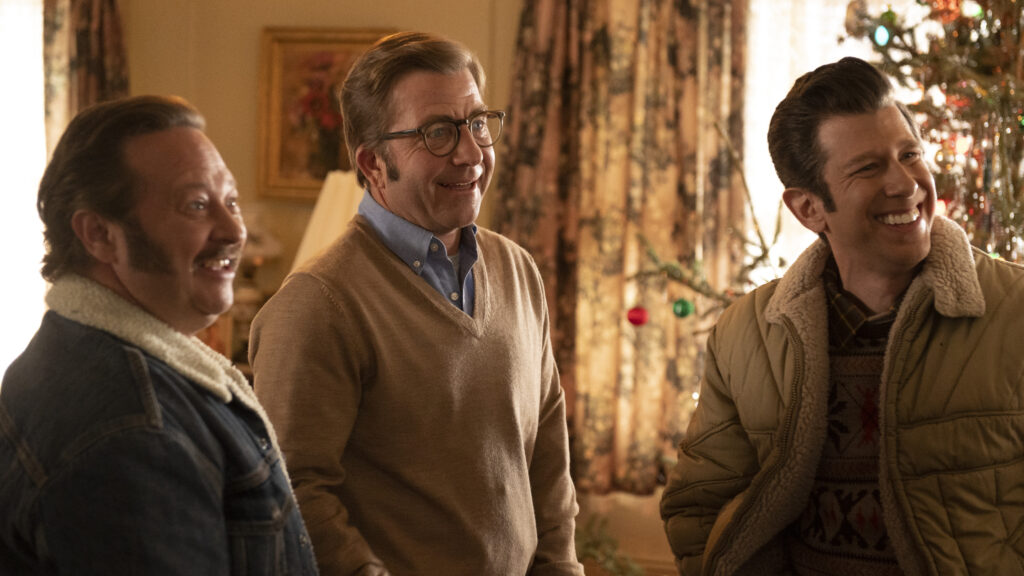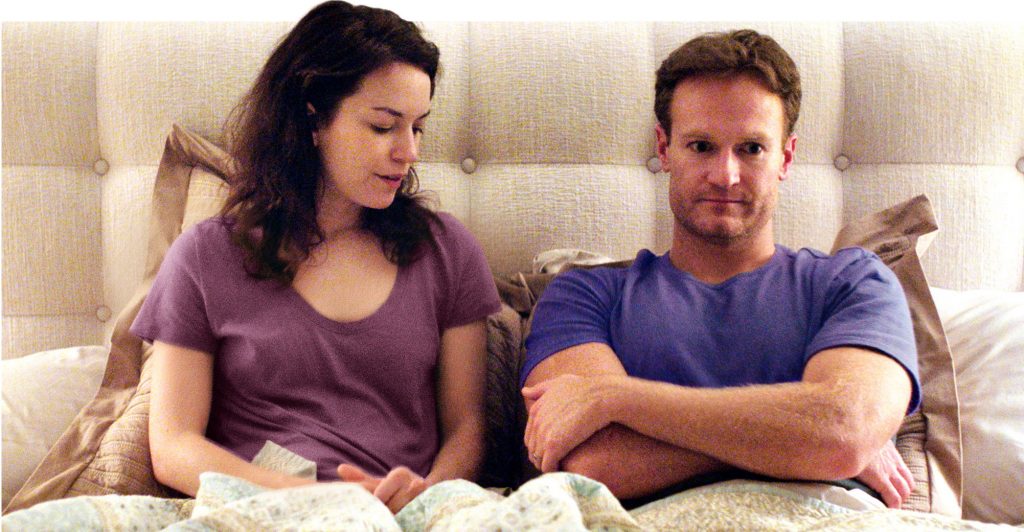December 25, 2022
by Carla Hay

Directed by Clay Kaytis
Culture Representation: Taking place in 1973, in Hohman, Indiana, and briefly in Chicago, the comedy film “A Christmas Story Christmas” (a sequel to the 1983 comedy film “A Christmas Story”) features a predominantly white cast of characters (with few African Americans) representing the working-class and middle-class.
Culture Clash: Ralph Parker, his wife and their two children go back to his hometown for the Christmas holiday after his father dies, and he feels the pressure of taking over as the family’s Christmas patriarch and fulfilling his dream to become a published writer by the end of the year.
Culture Audience: “A Christmas Story Christmas” will appeal primarily to fans of “A Christmas Story” and heartwarmng comedies about families during the Christmas season.

The very thin plot of “A Christmas Story Christmas” gets a considerable boost by its effective use of familiar Christmas movie formulas and relatable characters. It’s a sweet and sentimental sequel that lacks the rebellious spark of 1983’s “A Christmas Story,” but still has enough charm, despite some awkward handling of serious issues. Ralph Parker (formerly known as Ralphie Parker) now has a midlife crisis and grief over the death of his father.
“A Christmas Story” is based on Jean Shepherd’s 1966 semi-autobiographical collection of short stories “In God We Trust: All Others Pay Cash.” “A Christmas Story” was told from the perspective of 9-year-old Ralphie Parker (played by Peter Billingsley) in 1940, with hindsight voiceover narration by Shepherd in the role of the adult Ralph. Most movie fans know that “A Christmas Story” has become one of the most beloved American Christmas movies of all time, with its most memorable aspect being Ralphie’s obsession to get a BB gun for Christmas—specifically, a Red Ryder Carbine Action 200-shot Range Model air rifle—despite his parents’ objections to Ralphie getting this toy rifle as a gift.
A very inferior direct-to-video 2012 sequel called “A Christmas Story 2” featured a teenage Ralphie (played by Braeden Lemasters) and had the same main characters but played by entirely different cast members. “A Christmas Story Christmas” can be considered a true sequel to “A Christmas Story,” since it reunites several of the original cast members, led by Billingsley reprising his role as Ralph. Clay Kaytis directed “A Christmas Story Christmas” and wrote the movie’s screenplay with Nick Schenk.
It’s not necessary to watch or know about “A Christmas Story” before seeing “A Christmas Story Christmas” (which has some brief flashbacks to the first movie), but it does help to bring a deeper understanding of why Ralph has been hit so hard emotionally by the unexpected death of his father. Just like in “A Christmas Story,” adult Ralph (played by Billingsley) provides voiceover narration. But instead of looking back on his childhood, Ralph is commenting on his current life as a 42-year-old aspiring writer in 1973.
“A Christmas Story Christmas” has some simplistic and hokey dialogue that is par for the course for a typical Christmas movie. In the movie’s opening scene, which offers a panoramic view of the inside of Ralph’s modest house in Chicago, he can be heard making this comment in a voiceover: “When you’re a kid, all you want is the perfect Christmas. When you’re a parent, all you want is for Christmas to be perfect. But sometimes, if we’re lucky, the yuletide stars shine full upon us ina rare moment of truth. And how we act in those moments can forever seal our fate.”
Viewers soon find out that Ralph has quit an unnamed day job to spend an unspecified period of time trying to write what he hopes will be his Great American Novel. He’s been working on a science-fiction book called “Neptune’s Oblivion.” Ralph and his supportive wife Sandy (played by Erinn Hayes) came to this agreement: “I had to be published by the end of the year, or I’d pack up my dream and return to the rat race.” When the story begins, it’s mid-way through December 1973, and he still hasn’t been published.
“A Christmas Story Christmas” skimps on details about how Ralph and Sandy are paying their bills during the time that Ralph has been working full-time on his novel. It’s not mentioned if Sandy works outside the home. It’s not mentioned if Ralph and Sandy have been living off of their savings. But what the movie does mention repeatedly is that money is so tight for this couple, they sometimes run out of food and can’t afford to replace the faulty radiator for Ralph’s 1966 Plymouth.
Ralph and Sandy have two children: fun-loving son Mark (played by River Drosche), who’s 10 or 11 years old, and precocious daughter Julie (played by Julianna Layne), who’s about 7 or 8 years old. Sandy and Ralph try to hide their money problems from their children, in order not to worry the kids. An early scene in the movie shows that the family has run out of milk, so Ralph tries to convince the children that it will be fun to eat their Cocoa Puffs cereal with orange juice instead of milk. The kids are predictably disgusted.
Ralph has sent his 2,000-page manuscript for “Neptune’s Oblivion” to 16 book publishers. Out of those 16 publishers, 14 have rejected the manuscript so far. Ralph meets an executive (played by Ian Porter) at one of the last two book publishers that haven’t given him a response yet. The executive tells Ralph that his manuscript is rejected because it’s too long and not the kind of book the company is looking for right now.
After getting this bad news, a dejected Ralph goes home and gets a phone call with even worse news: His father has suddenly died. (The cause of death is not mentioned in the story.) Just as he does in “A Christmas Story,” Ralph affectionately calls his father “The Old Man.” n real life, Darren McGavin, who had the role of Ralphie’s father in A” Christmas Story,” died in 2006, at the age of 83.
Ralph’s parents had been planning to go to Chicago for the Christmas holiday to spend time with Ralph and his family. But now, Ralph and his family must go to his hometown of Hohman, Indiana, to spend the Christmas holiday with Ralph’s widowed mother (played by Julie Hagerty), who doesn’t have a first name in the movie. Hagerty replaces Melinda Dillon, who had the role of Ralphie’s mother in “A Christmas Story.”
The rest of “A Christmas Story Christmas” involves subplots that are variations of Ralph trying not to feel like a failure when he goes back to Hohman. His father was the family’s “Mr. Christmas” patriarch, who led the way in the family’s Christmas activities. Now that his father has died, Ralph feels it’s a huge void that Ralph can’t possibly fill.
However, Ralph’s mother makes Ralph promise that he will take over the patriarch role to make sure that the family’s Christmas holidays are as happy as possible, even this year, when the family is grieving over the loss of Ralph’s father. She also asks Ralph to write the obituary for Ralph’s father for the local newspaper. Meanwhile, Ralph is stressed-out over whether or not he and Sandy can afford to get the gifts that their kids want for Christmas. And time is running out on the deadline for him to become a published writer.
“A Christmas Story Christmas” features the return of “A Christmas Story” characters Flick (played by Scott Schwartz) and Schwartz (played by RD Robb), who were Ralph’s childhood friends. Flick is now the owner of a pub called Flick’s Tavern, while Schwartz is a barfly who lives with his mother, is frequently unemployed, and has run up a Flick’s Tavern bar tab that no one expects him to pay. A running joke in the movie is that some of the male customers go to Flick’s Tavern to avoid going home to their wives. And when these wives call the tavern to ask if their husbands are there, Flick or someone else always lies and says that these husbands aren’t there.
Most of the characters outside of the Parker Family, Flick and Schwartz don’t have much of an impact on the story. Larry Novack (played by some Henry Miller), a disheveled regular customer at Flick’s Tavern, is described as former classmate from high school, where he used to be a football star. Delbert Bumpus (played by Davis Murphy), who’s about 11 or 12 years old, is described as “the smartest member of the hillbilly family next door” to where Ralph’s mother lives. Delbert is a somewhat bratty kid whose other family members are never seen in the movie.
Zack Ward reprises his Scut Farkus role from “A Christmas Story,” in a cameo that lasts for less than 5 minutes. Scut’s current occupation is revealed. Viewers of “A Christmas Story Christmas” will get to see if Scut is still a bully or not. Also making a quick cameo is returning cast member Ian Petrella, as Ralph’s young brother Randy Parker, who is now a successful businessman who travels around the world.
Speaking of bullies, “A Christmas Story Christmas” has two unnamed adolescents (played by Cailean Galloway and Alistair Galloway) repeatedly wreaking havoc in the snow by driving snowmobiles and plowing into snowmen made by Mark and Julie outside the house of Ralph’s mother. And it wouldn’t be “A Christmas Story” movie if it didn’t have Christmas shopping and a visit to Santa Claus at Higbee’s, the biggest department store in Hohman.
Most of the scenarios in “A Christmas Story Christmas” aren’t suspenseful but they bring some laughs (and some cringes) in how the adult Ralph and his family members handle some of these situations. There are some quirky moments, such as when Ralph and his mother reveal that they have an irrational fear/dislike of Christmas carolers who go door-to-door, but Sandy feels the opposite way. Sandy is also an ice skating enthusiast. You can easily predict what happens when someone goes ice skating in a comedy film.
Some of the acting is a little stiff, but “A Christmas Story Christmas” is so good-natured the weaker elements of the story do not ruin the movie. Billingsley does a perfectly fine job in the lead role of Ralph, while Drosche and Lane have some cute moments as Mark and Julie. None of the cast members is terrible in these roles, but no one truly stands out as a breakout star either.
“A Christmas Story Christmas” is a pleasant movie that hits all the expected beats of a Christmas film that was made to appeal to a family-friendly audience. Because “A Christmas Story Christmas” is told from an adult character’s perspective, Christmas takes on a more serious meaning than just childhood pranks and wanting a certain toy for Christmas. “A Christmas Story Christmas” is still very much a comedy, but it has more maturity in this likable sequel story where its merits outweigh its flaws.
HBO Max premiered “A Christmas Story Christmas” on November 17, 2022.




